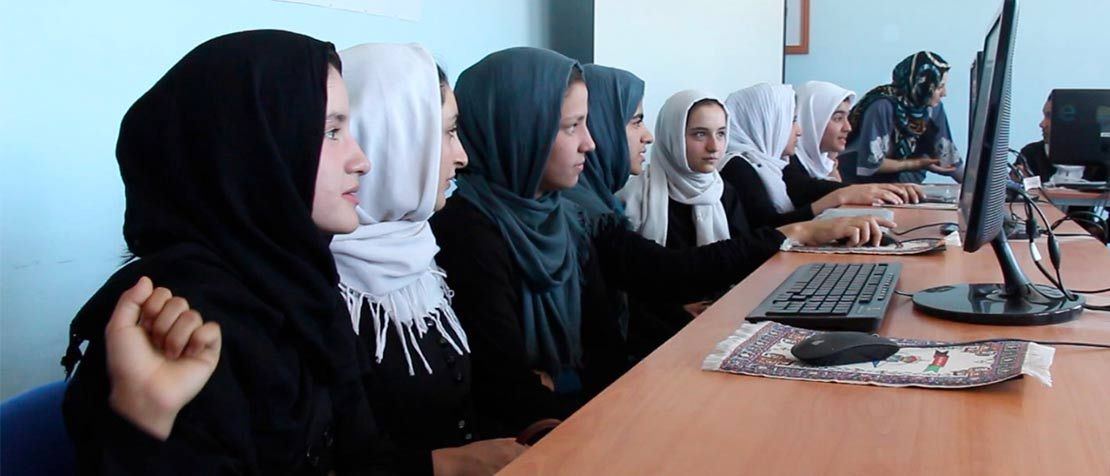
Good mentoring: 3 ideas to support girls to develop STEM/ICT skills
The differences between adolescent girls’ and boys’ participation and interest in science, technology, mathematics and engineering (STEM) and information and communication technologies (ICT) persist in most societies. Adolescent girls show lower interest in STEM and are less represented among top performers in standardized science tests.
Very early on girls are exposed to learning environments at home and in school that present an idea of STEM and ICT as fields for men where boys can “naturally” succeed. These stereotypes lead girls to believe that STEM and ICT are not areas where they belong or where they can learn, and create self-doubt about their own abilities.
It is the lack of self-confidence, not their abilities, that drives girls away from STEM/ICT. But to succeed in STEM/ICT, one needs to fail many times, continue trying, refining strategies, until finally a problem is solved, an explanation is posed, and one moves to the next challenge. This process can be exhilarating if you believe in yourself, or spirit-breaking if you already believe you are somehow lacking and “not good at STEM”.
It is the role of educators, mentors and caregivers to challenge the gender norms that lead girls to doubt their own abilities.
STEM/ICT education can not only lead to future better employment for young women, but also supports the development of essential skills for solving problems in our communities, staying healthy and participating productively in the most important debates of our times (e.g. climate change).
So how can we mentor all girls to participate in STEM/ICT? Here I present a few ideas:
- Teach a growth mindset: Girls can be taught that intelligence and ability develop over time, especially when we persevere through failures and setbacks until we reach our goal. When girls learn that every time we fail – at solving a tech challenge, or a science problem – we are learning and growing, their self-image doesn’t deteriorate, and they embrace their own potential as entrepreneurs, inventors, and empowered agents of change. It is important for teachers and mentors to not penalize children for failing and to encourage girls to take risks, so that an enabling environment is built for girls and boys to have equal opportunities to develop a growth mindset.
- Share stories of success: Role models can inspire us and help us see ourselves reflected in someone we admire. By learning about women and girls who have persevered and succeeded in STEM/ICT girls can debunk gender stereotypes that hold them back. If you are a woman working in STEM/ICT, volunteer, share your story with schoolgirls and encourage them to ask questions and claim credit for their own ideas. If you are a teacher or a parent, there are many resources for young girls, adolescent girls and women useful for teaching both girls and boys the important contribution of women to science and technology.
- Support the most marginalized girls to participate in STEM/ICT: Girls who speak a language different from the language of instruction or who live in poverty and face ethnic or racial discrimination have less opportunities to access education that support them to develop STEM/ICT skills. Women in these same groups are under-represented in STEM/ICT, making it difficult for marginalized girls to find role models who talk like them, look like them and empathize with their lived experiences. Advocating for quality education that includes STEM/ICT for all girls and opening paths for their transition to the STEM workforce is essential. Supporting the establishment of peer networks in school and out of school where girls can share their interest in STEM/ICT can also make a difference. And most importantly, make STEM relevant for girls. Using technology and science to solve problems in their lives and communities is empowering for girls and helps them develop a voice.
Working towards achieving gender equality in STEM/ICT is central to the 2030 Agenda for Sustainable Development, aimed at eliminating poverty, healing our planet, realizing the human rights of all and to achieve gender equality and the empowerment of all women and girls.
Leaving out girls and women from STEM/ICT education and careers perpetuates gender inequality, limiting the opportunities of girls to access digital learning, better paid jobs, and limiting the opportunities women have in solving the environmental and social challenges of our world.
We need to start changing the narrative and we need to start early. Mentoring girls to believe in themselves and pursue their dreams in STEM/ICT can create long-lasting change.
